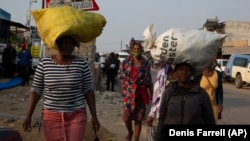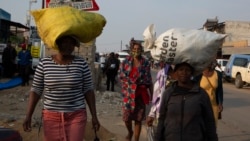Many women in Africa start small to medium businesses each year to overcome poverty, building a better future for their families and subsequently their communities.
Development experts warn, however, that even though there has been considerable progress in the last decade - as conditions improve, and more women entrepreneurs enter the marketplace - still, a combination of socio-economic factors hinder their advancement.
VOA' Jackson Mvunganyi spoke with Amit Dar, an economist with the World bank, who said that countries need to address some of the persistent gender gaps and inequalities that contribute to women getting lower earnings than men.
The interview was edited for brevity and clarity
VOA: What is the development case for investing in women in Africa?
Dar: I think what is really very important is that for Africa to reach its human capital potential, they will not do that without reducing their fertility rates. Right now the fertility rates in Africa are 4.8 , while around the world, the fertility rate is 2.4. So, you know, as you can imagine lower fertility rates leads to help their mothers and children. Greater labor productivity increase per capita investment in the next generation of workers and really unlocks the demographic dividend, which is what we want to do. So the best way to support this transition is really to invest in women's and girls empowerment, improve their education, improve their health, give them access to greater economic and employment opportunities...There is a lot that needs to be done and can be done and putting money in this area is going to reap huge dividends in the future.
VOA: What are some of the barriers that impede women's participation in business or in economic development?
Dar: It's a combination...Basically some laws for example which prevent pregnant girls from going to school. You need to put in laws which provide stronger legal protection against gender based violence for women and children...As well as investing in education and health...We've seen numerous examples from around the world that when those opportunities are open and available, girls do fantastically, and the economy does very well.Those are the types of things we need to solve.
VOA: There are persistent cultural attitudes that continue to impede girls' education. How does that change in the next 20 years as we are pursuing the sustainable development goals?
Dar: I think it's a combination of several things. One is a lot of communication around the importance of investing in girls and girls education, investing in women, and showing that this reaps significant benefits for society and for the economy. That's number one I think. Number two is to actually get the community leaders and community elders very much involved. I mean it can be a message from the top of course, which will be very important. But you really need the communities to actually buy into this message. And to getting them involved once you have your community leaders saying that yes, I need to make sure that girls in this village are going to school. It changes the whole dynamic...So we've seen for example in Bangladesh that is what they did in the early 90s where they got the religious leaders very much involved in supporting girls education. And in a matter of one generation, the whole system changed. There was the girls enrollment rate doubled in one generation. These girls, who then became women, joined the labor market, started working Bangladesh at this big garment industry. So all of that changed the whole structure of the economy and it really changed also the dynamics at the household level, with women having greater say in what was happening in the household because they also had economic power.
VOA: Do you see that type of model also working in sub-Saharan Africa?
Dar: Very much could work in sub-Saharan Africa. We are doing some very innovative things with governments in the Sahel to our women's empowerment and demographic dividend programs, where we are basically working with them at early ages in terms of maternal and child health, trying to get girls into school and then giving them access to employment opportunities. But we. are always making sure that the community is very well involved in the decision making and taking the lead in that. Because I think once that also happens it changes the dynamic very quickly. And I think we'll see within a generation or less actually significant changes happening because of some of those types of interventions.
VOA: What are some of the lessons that we are learning about the importance of women's participation in economic development during this time of the global pandemic?
Dar: it's a real challenge right now. I have to be honest, because, you know, economies are still not fully recovered. I think if you take a little bit more time and and that's why I we we think that the focus on this issue needs to be even more pronounced, because there have been games that have been made over the last 20 years or so. So we risk losing that... And if we lose that that is really going to take a long time to recover and then to improve over the current condition, we're going to lose two or three generations. So I think the key message that we should be sending to policymakers and counterparts in countries is that please keep that focus on please make sure that that investment is not reduced because you're really going to negatively impact future generations of your citizens and future economic growth.






